Due to Coronavirus concerns, the reading originally scheduled for August 12th has been cancelled. Hopefully we will be able to reschedule it at a later date.
Thank you.
Due to Coronavirus concerns, the reading originally scheduled for August 12th has been cancelled. Hopefully we will be able to reschedule it at a later date.
Thank you.
This brutal, magnificent historical novel takes place in central China (sort of around Wuhan, if my correlation between the map in the book and today’s maps is correct), when the Han Red Turban Rebellion was fighting against the Mongol Yuan dynasty (1345-1356). There is very little fantasy, except that some of the characters with the courage to maintain their destined paths can see ghosts and sometimes make themselves glow with the light of Heaven. Neither of these talents is particularly useful–though it seems to be necessary to glow in order to become Emperor, that ability does not guarantee survival. But there is plenty of sweeping war, calculated murder, and exquisite betrayal.
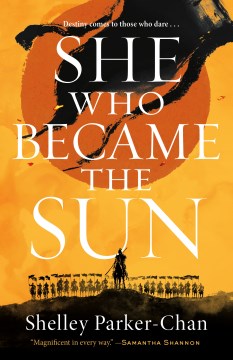
At the same time, it is an insightful novel of self-discovery, an exploration of gender and identity, and a critique of the idea of destiny. A peasant woman who calls herself by her brother’s name, Zhu Chongba, with a combination of skill and luck, becomes a leader in the Red Turban Rebellion. In order to rise in power, and claim the destiny of “greatness” her brother refused by dying, she must deny both gender and self. The brilliant general leading the war against the Rebellion, Ouyang, is an enslaved eunuch from a disgraced and murdered family. He lives despite the shame of his lost masculinity, feeling himself worthy of nothing except to carry out revenge. They both adhere to their misguided destinies regardless of the cost to themselves or those around them.
However, both the general who is not quite a man and the peasant risen to lead a rebel army, who is not entirely a woman, seem to want the same thing: the overthrow of the Yuan emperor in far-off Khanbaliq (near modern Beijing). Many of the characters in the book are actual historic figures, including Zhu who later renames herself Yuanzhang. Since the Yuan dynasty actually was overthrown by the Red Turban Army led by Zhu Yuanzhang in 1368, presumably that desire will be granted. This will have to happen in our imaginations unless, of course, there is a second book.
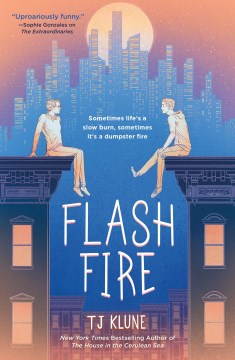
This was supposed to be a review of TJ Klune’s newest book for young adults, Flash Fire, but that is a sequel to The Extraordinaries, and I found that I couldn’t write about the second book without revealing spoilers from the first one. I am quite fond of Klune’s writing, and liked both books for their snide humor and ability to explore relationships between queer teens without the need for them to question their orientation. So I’ll stick with the first book.
The main protagonist (of both books) is sixteen-year-old Nick Bell, who has problems focusing and often blurts out things he shouldn’t say, but is totally focused when it comes to his crush, an “Extraordinary” who calls himself Shadow Star. Nick has never met Shadow Star, but has generated hundreds of thousands of words of fan-fic starring himself being rescued by Shadow Star, usually from his nemesis, Pyro Storm. His story seems to be stalled because Nick seems a little fuzzy on (if not grossed out by) what, exactly, is involved when it comes to post-rescue things like physical intimacy and being in love.
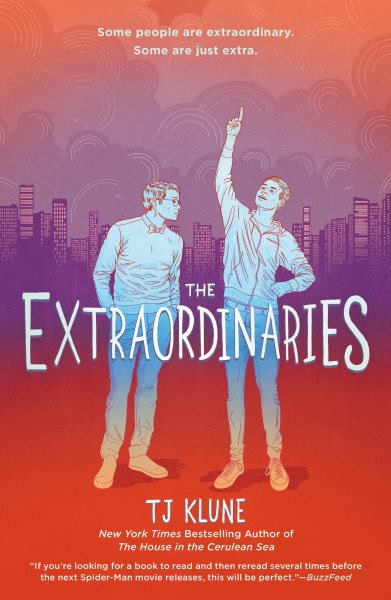
Nick is surrounded by a supportive and wonderful cast of both kids and adults. His best friend forever, Seth Gray, is ready to do anything for Nick, from beta reading his fan-fic to making sure he gets to school on time — anything, that is, except acknowledge their feelings for each other. At school, they hang out with Gibby, a Black self-described “baby dyke,” and her cheerleader girlfriend, Jazz, both mouthy and critical without being condescending. Then there is Owen, who lurks in the background but once was Nick’s almost-boyfriend.
Together Nick and Seth are feeling their way toward self-acceptance and adult relationships, despite the meant-to-be-helpful advice of their loving parents. (Okay, as in many YA books, most of the parents are dead. Nick has a father, and Seth an aunt and uncle. Happily, none of them ever question their offsprings’ orientation.) Their romance is hilarious and tormented, weird and completely normal, and unfolds as the real Extraordinaries Shadow Star and Pyro Storm become increasingly violent in their attempts to bring justice to the city.
We have so much going on next week here in the store!
Wednesday the 28th, we will be hosting a pop-up shop for Vinegar Syndrome, a fantastic boutique shop for the weird and wonderful on DVD and Blu-Ray. A representative will be here from 4-8 pm with a selection of their best, offering special deals and giveaways. Check them out online at VinegarSyndrome.com and if you like what you see, come on down and see what they bring!
Thursday the 29th, Speculations will be back with their first reading here at the store since the onset of Covid with two authors, Michael Merriam and Abra Staffin-Weibe. The event runs from 6:30-7:45 pm and refreshments will be provided. Merriam and Staffin-Weibe are guests at Diversicon 2021, taking place July 30- August 1st.
And finally, Saturday the 31st, authors Larry Correia and Mike Kupari will be signing their books from 3-5 pm as a fundraiser for Uncle Hugo’s Bookstore. All proceeds from the sales of their latest titles, Larry Correia’s Monster Hunter Bloodlines and Mike Kupari’s The Family Business will go toward helping Uncle Hugo’s reopen.
I have been a fan of Rainbow Rowell since reading her first novel for young adults, Eleanor and Park, which remains one of my favorite nerd romances. I also very much liked Fangirl, about a young fan writer who learns some difficult lessons about love, family, and writing your own story during her freshman year as a college English major. (Look for the new graphic novel adaptation from VIZ Media!)
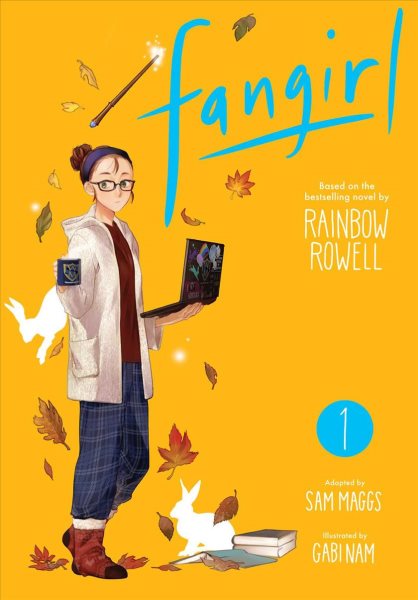
In order to write about a fan writer for Fangirl, Rowell needed a popular fantasy series for her protagonist to be a fan of. She invented the “Simon Snow series,” a Harry-Potter-like fantasy that takes place at Watford School of Magicks, a residential school for magicians which is invisible and inaccessible to “Normals.” Her fangirl protagonist writes slash fan-fic about Simon Snow, who just might be the Chosen One destined to save the World of Mages, and Basilton (Baz) Grimm-Pitch, his roommate, who just might be his worst enemy. Rowell’s fictional series became real when she wrote Carry On, the story of Simon and Baz’s years at Watford, and then Wayward Son, which begins to deal with the effects of their traumatic experiences.
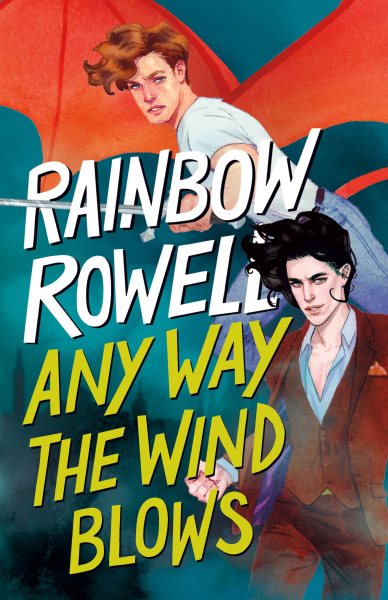
Any Way the Wind Blows is the third book in Rowell’s Simon Snow trilogy. By this time, Simon and Baz are past admiring each other in secret and on their way to becoming lovers. But memories and misunderstandings from their school years, when they fought for and saved the World of Mages, constantly intrude. I do not usually seek out angsty romance, but found Simon and Baz tender, funny, and engaging. I enjoyed watching them grope their way (literally at times) toward growing up and moving past their heroic roles. Not many books acknowledge that, when someone saves the world as a teenager, getting on with the rest of their life might be somewhat difficult.
The cover copy says that this book takes place “in the world of The Goblin Emperor,” a novel that I read several years ago and remember very much liking. It was one of the first books I encountered where quiet kindness was a clear force for good in the face of violence and injustice.
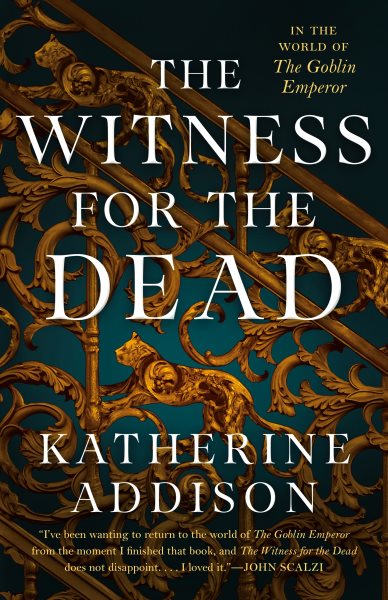
The Witness for the Dead does make reference to some of the events of The Goblin Emperor, but I did not feel lost or excluded by my lack of memory of the details. The Witness, Othala Thara Celehar, seemingly made some wrenching decisions in the first book, leading to the death of his lover. Rather than being confused, I found myself wanting to reread The Goblin Emperor to spend more time with him.
Now in a sort of self-imposed exile, Celehar continues to do his job as requested, listening to the last moments of the dead with integrity and without regard to the political ramifications of his findings. The book resembles a mystery novel as his duty calls upon him to solve several twisting murders, none of which is made easier by his ability to read the victim’s final moments. He pursues his witnessing with too much honesty to be tactful, and a self-effacing gentleness that ignores class and status. It is a lovely reflection on the value of service and competence; a portrait of a person whose innate sense of honor allows him no other options.
I have a particular fondness for books about people who work with books—booksellers, writers and, of course, librarians. I couldn’t resist The Library of the Unwritten, subtitled “A Novel from Hell’s Library” and “Join the Library. Raise Hell.” The story is, perhaps, less outrageous and far more wise than the cover copy suggests, but it certainly features the adventures of Hell’s Librarian and her assistants.

The idea that all unfinished books are stored in a magical, boundless library is not new, nor is the idea that characters can escape from books and make trouble. Usually, though, the library is not located in Hell and overseen somewhat dangerously by Hell’s bureaucracy. And it’s usually not the job of the library staff to go chasing after characters to force them back into their books, violently if necessary.
The current Hell’s Librarian is a practical, almost prim Black woman named Claire who would be middle-aged if she weren’t dead. Her assistant is a failed Muse named Brevity, a small joke that is never actually told. There are also two demons, who may or may not be reliable, and an otherwise unnamed Hero escaped from one of the books. Pursued by angels and demons alike, they must brave Earth, Hell, and a variety of Heavens in order to recover the lost pages of a book so powerful it could destroy the balance of power between the realms–not to mention endanger the existence of the Library.
This is the first novel in what will likely be a massive fantasy series by a very promising Nigerian author. Unlike several new epic fantasies, which I never quite got through, I finished this one in two long days of obsessive reading. It is a gritty novel that takes place on the continent of Oon, a small land of desert, rainforest, and savannah and home to several complex, interconnected countries. Though clearly not based on the European model of Courts and Kings, the warring states on the continent are every bit as domineering, corrupt, and nasty as those of any fantasy version of Europe.
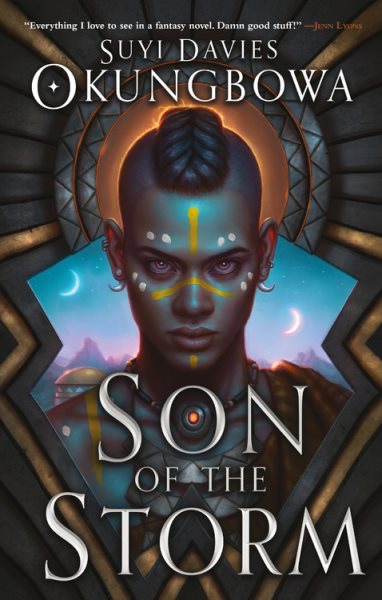
The book has been described as an “African fantasy,” possibly because the phrase “African Game of Thrones” has already been taken (by Marlon James’ Black Leopard Red Wolf). As in Game of Thrones, the story is told from multiple perspectives. There is no one who is typically heroic, and almost everyone is misguided and a bit self-centered, if not actually evil. Unrecognized by most of the inhabitants, Oon is being threatened by drought and encroaching seas. Magic is rare, costly, and seems to involve a lot of blood and suffering. However, unlike in GoT, the author is acutely aware of the forces wrought by discrimination based on class and race, with the darkest Black people claiming superiority and very willing to kill to prove it.
The two main protagonists are Danso, a student of history at a prestigious university, and Estheme, his “intended,” studying law at the same university. They are both outcasts, though for different reasons, and will clearly have to take different paths to the gain the acceptance they crave. There is wisdom between the lines of their journeys; insight from the author into the causes and effects of racism, as well as acknowledgement of the difficulty of bringing about change. The end of this first book leaves a lot of questions, the answers to which will undoubtedly be riveting but not necessarily pleasant.
This book is a collaboration between author Joanne M. Harris, known best for her mainstream books (most famously, Chocolat, which was made into a movie), and fantasy/comics illustrator Charles Vess (Neil Gaiman’s Sandman and Stardust). It is a series of short “original fairy tales,” none longer than a few pages, which together tell a deceptively simple tale of the Kings and Queens of the Folk, and their often-mystifying interactions with humans.
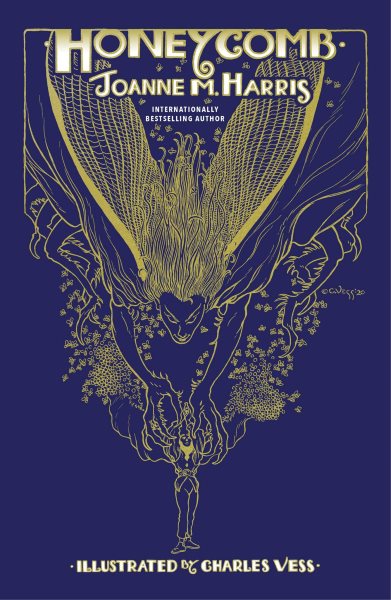
The illustrations are lovely and entirely fit the story, which is told with the distant, dispassionate prose often used for myths and children’s folk tales. The artwork, rendered in both in black-and-white and watercolor, likewise seems childlike, with spare lines and expressionless faces. But there is complexity behind both story and art, a deep exploration of morality, imagination, and the many ways in which humans deceive themselves.
This is not a book for children, even read aloud. It is not a book to be read quickly for excitement or thrills. It is meant to be read and re-read, examined and pondered. It is quite likely that each tale will say something a bit different with each reading, and that the book will change its lessons over time. It is a book to be treasured, a beautiful volume that will sit happily on a shelf to be returned to time and again, for years.
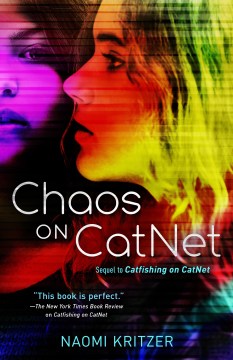
CatNet is a social media platform managed by a sentient AI known, at least to our adolescent protagonists, as CheshireCat because of their interest in cat pictures. (CheshireCat uses the singular ‘they’ pronoun.) CheshireCat revealed their identity to some of those adolescents in the first book, Catfishing on CatNet. In many ways, CheshireCat is also an adolescent, and both human and AI must learn how to be best friends and support each other, though one of them is a powerful, virtually unlimited internet entity.
Local writer Naomi Kritzer has won many awards for her CatNet stories, including a Hugo several years ago for the short story ‘Cat Pictures, Please.’ Catfishing on CatNet won a hefty list of awards in 2019, including an Edgar Award, a Minnesota Book Award, and a Lodestar Award. It is not necessary to read the first book in order to follow the second, but I’d recommend it anyway, because it also is pretty wonderful.
Chaos on CatNet is another solid story, with a cast of engaging, confident, diverse adolescents. It also, surprising for a young adult book, has several reliable adults, including a loving polyamorous family. The story explores the power of the internet both to bring people together and, for better or worse, to influence those people’s actions. It takes place in a Minneapolis that, ten years from now, has made some recognizable, optimistic changes following the riots of 2020. We probably should apologize in advance for what happens to the James J. Hill House, though.
This is a much-acclaimed first novel, including being a New York Times bestseller and winner of the Coretta Scott King-John Steptoe Award. Legendborn is now also nominated for a Lodestar Award for Best Young Adult Book (presented by the World Science Fiction Society, the same group that gives the Hugo Award).
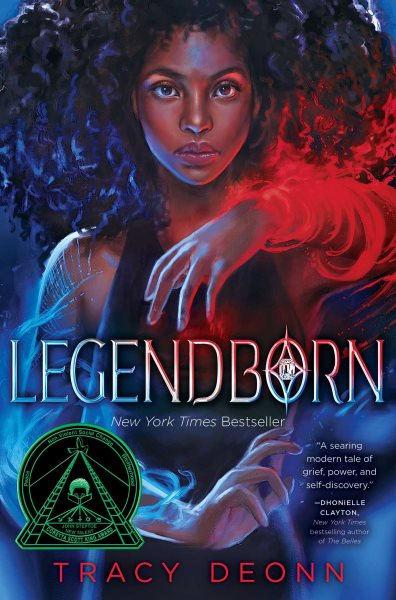
The novel deftly weaves traditional fantasy based in Mallory’s King Arthur with her invention of a more esoteric old magic shared by Black women. Deonn’s version of women’s magic, unsurprisingly, was learned during slavery and passed down in secret. But her Round Table is almost unrecognizable; a hierarchical secret society resulting from careful cultivation of wealthy blood lines. The author’s world-building is excellent, infusing both types of magic with her own creative mix of old and new ideas.
Legendborn is essentially a love story between a privileged Black girl who has been denied her magical heritage, and a white boy who doesn’t want his own very privileged magical station. It is an exploration of race and privilege, providing mild instruction for the reader on the annoying effects of subconscious racism. But it also has demonic enemies, magic rituals, and teenagers with what amount to magical superpowers. It is a gripping magical adventure with fighting, suspense, friendship, and betrayal.
Sadly, though the ending is not too much of a cliffhanger, the end of the book is clearly not the end of the story. It seems to be the beginning of a series, but I couldn’t find even a title for a second book.
This is a raw, chaotic, difficult novella, bursting with righteous anger and inconsolable grief. It is a graphic documentation that violence against people of color has not ended; it is the only thing we see in Onyebuchi’s dystopian near future. The tally of injustices flashes by, unexplained and unmoored in time, skipping randomly among present events, memories from the recent past, and glimpses of a terrible future.
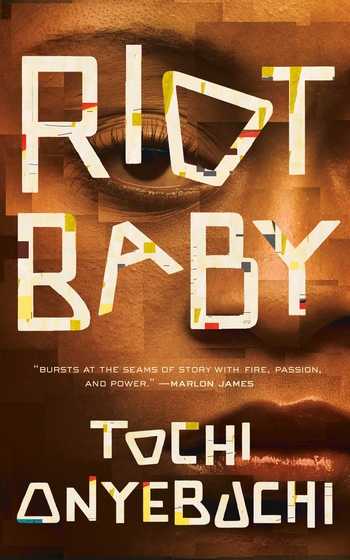
The story is told by two siblings, a younger boy (Kev), born during riots that destroy San Francisco, and his few-years-older sister (Ella), whose magical abilities enable her to see visions of violence. Ella’s visions both predict the future and replay past memories held by people and places. But her magic turns destructive in her teens, particularly after smart, successful Kev loses his way in violence. Kev must learn to control his rage in order to survive prison, though he is never allowed to forget it. Ella tries to channel her powers, but her own rage builds with every vision. In the end, it may be best for their world to burn.
This novella has been nominated for a 2021 Hugo Award.
Witch Hat Atelier has become my new favorite manga. It is a great place to start if you are interested in manga but confused by the enormous number of titles and volumes available. It is well-written, beautifully drawn, and easy to follow, though it does have to be read from front to back of the book. It has proven itself in Japan, coming out regularly since 2017 and collected into books (called tankobon) about every six months. At only seven volumes so far, there is plenty to be captivated by, and it is still easy to catch up with the story.
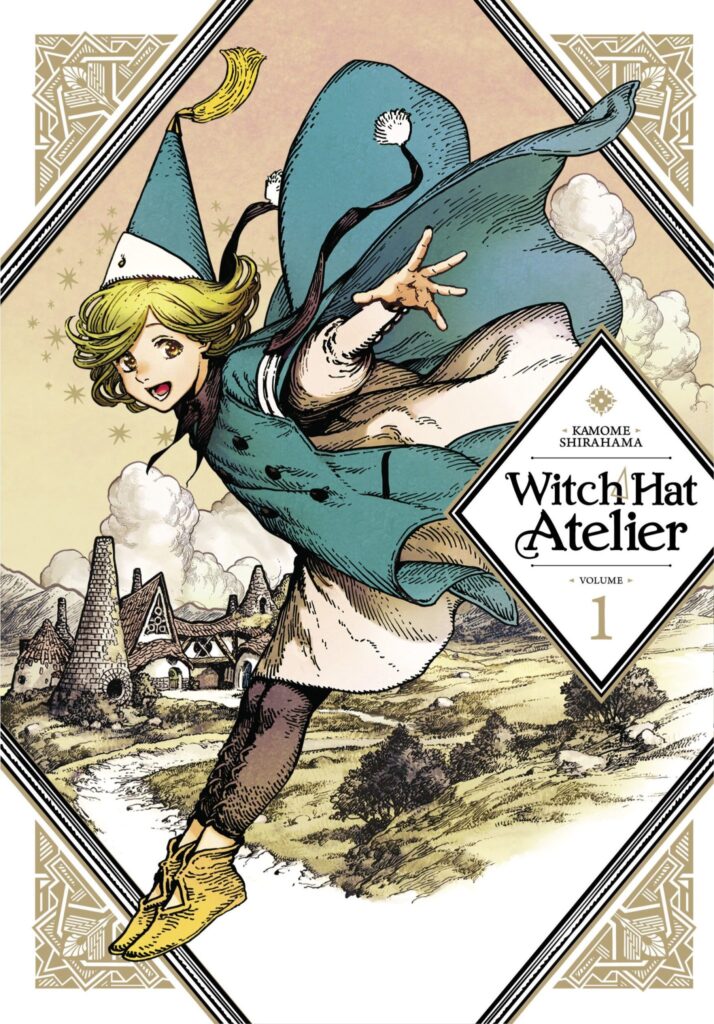
I highly recommend it for just about anyone age eight and up. To read a more complete review, go to www.twincitygeeks.com.
There has been a rash of young adult fantasy novels featuring strong teenage girls coming into some sort of magical power. A Deadly Education, billed as “Lesson One of the Scholomance” is one of my favorites.
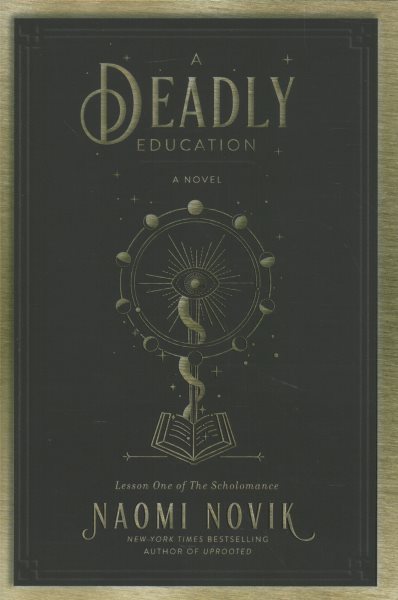
The Scholomance is inspired by Hogwarts, but it is orders of magnitude less benign. In this world, monsters called maleficaria are everywhere, and they find magical adolescents particularly tasty. So, the kids are walled off in an inescapable magical high school to keep them safe during those tender years. As a side benefit, the school is supposed to teach them to use their magic. But the school’s protections have worn down over the years, and the school itself is an unreliable teacher. There are no remedial lessons and failure is often rewarded by death.
Our wonderfully snarky heroine, Galadriel (El for short, certainly not Gal) is a junior. She is extremely powerful, but only if she uses evil magic, which she absolutely refuses to do, so she is barely surviving her schooling. Her likely-fatal pathway changes when she meets a privileged, popular classmate named Orion Lake, who is quite clearly the wrong guy for her.
What follows is a delightfully chaotic mix of dangerous lessons–about magic, class privilege, true friendship, romance, and the cost of evil. Given the increasing number of maleficaria, it seems unlikely that anyone will make it through the year. Though Lesson One doesn’t end on too bad of a cliffhanger, we know that El and Orion still have another year to get through.
A Deadly Education is coming out in paperback soon. Lesson Two of the Scholomance, called The Last Graduate, is expected in July 2021.
It’s that time of year again! It’s time for Independent Bookstore Day, but this year because of the pandemic, it’s going to be a little different. April the 24th is still Independent Bookstore Day, but it you’re going to take part in Rain Taxi’s “passport” event, you have a week to do it, starting Sunday, April 18th.
For those of you who aren’t familiar with it, for the last few years, Rain Taxi has organized an event with a “passport”, where you go around and collect stamps from different bookstores. Each stamp turns into a coupon for the next time you’re in the bookstore. If you get 10 stamps, you activate the coupons for all 23 participating stores. If you collect all 18 available stamps (5 stores are participating, but not yet open for in-store shopping or getting stamps) you qualify for their drawing of one of five literary prize packs, or the grand prize.
Full details are on the Rain Taxi website here: https://www.raintaxi.com/literary-calendar/twin-cities-independent-bookstore-day-passport/
This book came highly recommended by a customer, who said it was so good she read it in less than two days. It took me a bit longer than that because I wanted time to savor the elegant prose, and because some scenes were so wise and emotionally wrenching that I had to stop and let them sink in. I can certainly second her recommendation.
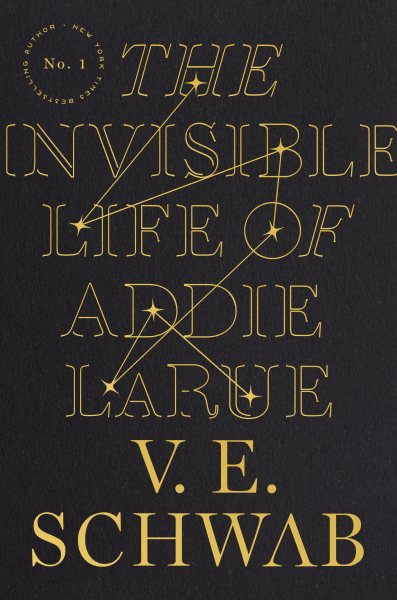
For me, the book was not a page-turning fantasy adventure, but a melancholy love story exploring the effects of time and memory. Addie LaRue’s story is a cautionary tale about being careful what you wish for, because wishing badly could be (literally) damning. But she is a strong woman, able to resist her assigned fate and play a centuries-long game with the being who subverted her wish by fulfilling it too exactly.
Despite her trials, Addie is a joyous observer of life, always looking for something new and exciting, though she, herself, must be forgotten as soon as she is out of sight. She becomes the embodiment of the mysterious women who appear in countless works of art, influential but entirely unremembered. The book is a lovely exploration of the fullness of life and the lasting nature of art: Would you rather your life be remembered or create something that persists through the ages?